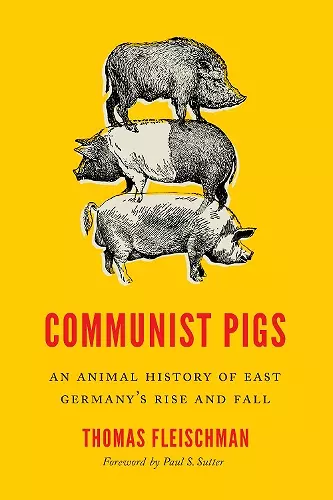Communist Pigs
An Animal History of East Germany's Rise and Fall
Thomas Fleischman author Paul S Sutter editor
Format:Hardback
Publisher:University of Washington Press
Published:30th Jun '20
Should be back in stock very soon
This hardback is available in another edition too:
- Paperback£23.99(9780295750699)

What industrial agriculture reveals about communism—and capitalism, too
The pig played a key role in the German Democratic Republic's attempts to create a modern, industrial food system built on communist principles. By the mid-1980s, East Germany produced more pork per capita than West Germany and the UK, while also suffering the unintended consequences of manure pollution, animal disease, and rolling food shortages.
The pig is a highly adaptive animal, and Thomas Fleischman uncovers three types of pig that played roles in this history: the industrial pig, remade to suit the conditions of factory farming; the wild boar, whose overpopulation was a side effect of agricultural development; and the garden pig, reflective of the regime's growing acceptance of private farming within the planned economy.
Fleischman chronicles East Germany's journey from family farms to factory farms, explaining how communist principles shaped the adoption of industrial agriculture practices. More broadly, Fleischman argues that agriculture under communism came to reflect the practices of capitalist agriculture, and that the pork industry provides a clear illustration of this convergence. His analysis sheds light on the causes of the country's environmental and political collapse in 1989 and offers a warning about the high cost of cheap food in the present and future. Communist Pigs was a finalist for the Turku Book Award, European Society for Environmental History.
"[A] fascinating and exhaustive study...An excellent storyteller, Fleischman has produced a very well-written book that will be useful togeneral readers and specialists alike."
* Choice *"[D]escribe[s] the shifting, meaningful relationship between hogs and humans, a relationship worthy of our attention."
* Ohio Valley Review *"Communist Pigs gives historians in many fields much to think about: the German Democratic Republic, the Eastern Bloc, Cold War diplomacy, late-twentieth-century capitalism, German reunification, industrial agriculture, environmentalism, and the pig. Fleischman convincingly argues that pigs' centrality to the GDR's trade with foreign nations, organization of internal priorities, and creation of challenges for the regime to grapple with makes them an effective lens for studying these histories, and succeeds in challenging ideological interpretations of the Cold War's outcome and of global capitalism's legacies."
* H-Net *"[A] remarkable first book... Communist Pigs makes a major contribution to the ongoing efforts to reframe East Germany’s environmental history."
* American Historical Review *"[P]acked with original insights. It represents a significant contribution to the intersecting histories of the environment, technology and science, and animals, and fills animportant gap in our knowledge about the relationship between communism, technology, and animals."
* Technology and Culture *"Remarkably well-written and accessible to a variety of audiences. . . Fleischman's monograph makes a highly original and much-needed contribution not only to the field of environmental history, but also to the history of East Germany, communism and the Cold War."
* International Review of Social History *"An inspiring, well-researched volume that will hopefully serve to nudge GDR history out of its niche. Much of GDR history does not really care about the world beyond East Germany's boundaries, and Fleischman shows that this is not for lack of rewarding context."
* Agricultural History Review *"[A] powerful, innovative, and useful intervention."
* Journal of Cold War Studi- Short-listed for Waterloo Centre for German Studies Book Prize 2020 (United States)
ISBN: 9780295747309
Dimensions: 229mm x 152mm x 22mm
Weight: 544g
296 pages